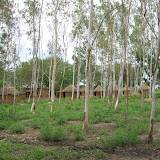Back at the training center, I've never thought I would feel so grateful for wonders such as toilet paper, phone service, and fans. The last two weeks (has it really only been that long?) have been pretty real. As we came into our homestay village, we were greeted by the villagers who had set up a huge celebration in our honor. As we walked out of the van, they grabbed us to join their dance/drum circle, which was a great way to meet the villagers. The village I am in is relatively large, which has its advantages - namely a small farmers market and the occasional cold soda at our local Boutigi - but it also means that each morning there are hundreds of people yelling "tubabu" ("white person") as I walk to class, and I am usually followed by a cloud of twenty children - the Tubab parade. I am living with the Chief of the village (the Dugutigi), and my host family is incredibly accomadating and tries their best to speak with me in a sort of French-Bambara-English creole. I am woken up each morning to the donkeys and goats outside my door. I am quickly getting tired of rice with peanut sauce, or the dreaded "to," a millet ground into a stonelike mound and covered in slimy okra sauce. We try to do yoga most afternoons - authentic Bikram sweat yoga in the 90degree heat - and even managed a full sun salutation in the sweeping rainstorm. The language training is really intensive, but I am amazed at our progress after less than two weeks, and I can actually put coherent sentences together. Friday night our village had a great "soiree," with a dj spinning drum and bass and Malian techno through a generator. We tried our Tubab best, but were in awe watching the amazing rhythm of the Malian youth.
At training, we finally has some great sector specific training, which reaffirmed my purpose here in Mali. We learned how to weigh and measure babies to monitor their growth and nutrition. Child malnutrition is one of the worst epidemics here, and with a population where 50% are under 15 years old, it is desperately needed. Some eye opening statistics: 27% of children in Mali under 5 are underweight foor their age (10% severely), and 38% of children under 5 are underheight. Pre-natal and neo-natal health is also a real need, with a 10% infant mortality rate. We also put together a health survey in Bambara, which I will compile during the first three months at my village. Tomorrow we will go to Bamako, the capital city, and then back to my homestay village.
Subscribe to:
Post Comments (Atom)

W O W !!!!!!!!!!!!!!!!!A M A Z I N G !!!!!!!!!! I N C R E D I B L E !!!!!!!!!!!!!!!!!!
ReplyDeleteLove, Love, Love and LOVE.
xxx's
This is AMAZING, Dina! I love your updates!
ReplyDelete